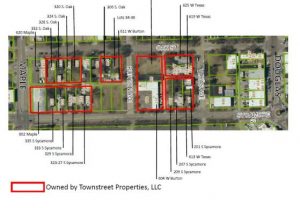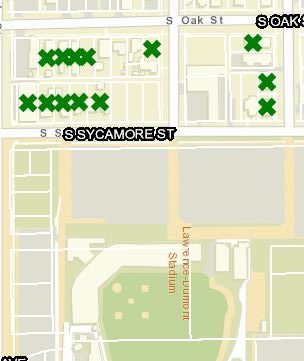The Wichita City Council is considering a private development agreement with Riverfront Partners for mixed-use development north of the new baseball stadium on land they are acquiring from the Metropolitan Baptist Church. The budget for the project is $127 million.
To help subsidize their costs, Riverfront Partners would qualify for $30 million dollars of CID and TIF funds after the first $10 million which goes to the city. Any TIF and CID revenue beyond $40 million is split between developers and the city.
To clarify, there are two different development groups owned by some of the same individuals: Riverfront Partners and Townstreet partners. The Riverfront Partners development is north of the baseball stadium on land owned by the Metropolitan Baptist Church. Townstreet Partners is the development group offering to sell land to the west of the stadium to the city for the purpose of providing additional parking. Townstreet Partners is a shell company owned by three other companies. According to state business records, the owners of three companies include George Laham, David Burke, Jerry Jones, and David Wells. The same four names are associated with the Riverfront Partners through the holding companies Laham Holdings, DJD West Bank, and DRK West Bank.
As part of the agreement, the city will get 100 parking spots on the land for public parking. However, the city will pay $400,000 to the developers for the construction of the parking lot. The city is also considering paying $3 million for three acres to be used for parking. That property is owned by Townstreet Partners. This equates to roughly $1 million an acre for parking to the west of the new baseball stadium. In early 2019, the city voted to give four acres to the developers associated with the new baseball stadium at $1 an acre; the city has not disclosed all the names of those involved with the baseball stadium project.
City Manager Robert Layton says the $3 million price tag is justified even as he admitted compensation for the developers was built into the price.
“We had an independent appraisal prepared on our offer and actually our purchase price reflects the appraised value, splitting the closing costs, and some compensation for carrying costs in the period time assembling the parcels and that gets us to three million,” said Layton.
No one knows exactly what the Riverfront Partners wants to build on the Metropolitan Baptist property. There are renderings of the potential use of the land, but as Joe Norton with Gilmore & Bell, the city’s bond counsel, noted what is going in the space is still a mystery.
“In a typical situation, we know exactly what they are going to build and how much it is going to cost and we can calculate that; here we don’t know exactly those details. So it is hard to determine exactly what that will be calculated until the project they have undertaken are completed and start generating,” said Norton.
George Laham speaking before the city council said the developers were committed to creating a regional attraction.
“We try to build market-driven plans meaning we listen to the market and we decide what we believe the market can support,” said Laham.
However, this begs the question: if the development is market-driven, why are the developers are getting so much government assistance? If the market demand is truly there, private funding should be as well.
Celeste Bogart Racette spoke out against the private agreement over the lack of transparency in the agreement, specifically noting blank pages in the city council agenda.
“I was stunned that we have no understanding of what is happening or of the maps and you are presenting this to the public and we have empty exhibits,” said Racette.
According to Racette, Laham is representing that Riverfront Partners did not buy any of the property that the city is looking to pay $3 million dollars for. Racette even asked the city council to confirm this.
“I did hear George Laham say they have not bought any property that is going to be apart of the $3 million that we are going to have to buy. Is that correct?” said Racette.
Mayor Jeff Longwell replied, “that is correct.”
But that’s not exactly true. Riverfront Partners may not have acquired the land to sell as a parking lot but Townstreet Partners did, and as explained earlier, the two companies have common owners. In June 2019, Laham was publicly saying that the land was bought for parking.
After a June 2019 meeting of the Delano advisory board, a thunderstorm was preventing many attendees from leaving the city building. About a dozen people were in the lobby waiting for a break in the storm. George Laham was in the lobby and approached a woman who had spoken in opposition to properties being bought up to the west of the stadium for parking. This reporter took notes of the conversation and as it was in a public area in a public building surrounded by strangers, there was no possibility for privacy and Laham made no attempt to seek it. In the conversation, he made it clear that he was buying up homes to use for parking for the stadium. `
“All I am here to do is help figure out the parking situation,” said Laham.
He went on to say that if people didn’t want to sell, “we’ll work around them,” notably because he revealed that parking was just part of the need and there is also storage to consider.
A comparison of state records (on the right) showing properties owned by Townstreet Partners and an image from the city’s Powerpoint Presentation (on the left) of the land the city is considering to purchase is a near-perfect match. 

The city council will take up the issue again on January 9th. A few council members expressed concern of the lack of information going out to the public and funding of the project. City Councilmen Brandon Johnson expressed concern about the price tag of the proposed agreement.
“I saw the number $127 million dollars which means it would be basically that much invested and how much of that would the citizens be responsible for? Part of that agreement showed anything above 10 million recovered from the financial tools, between the 10 million and 1 dollars and I believe 40 million would go to the developer. Kind of pay as you go, but the developers would not be paying, the citizens would be paying for that,” said Johnson.


